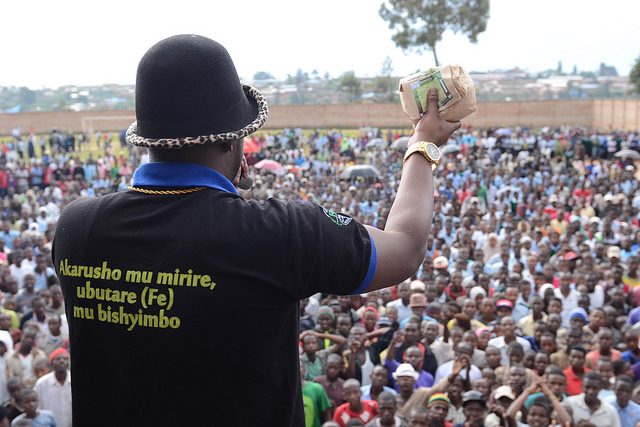Nearly 40 percent of children in Rwanda do not consume enough iron, which can have long-term consequences, including lower learning capacities, resistance to disease, and diminished energy levels. However, a new biofortified bean variety containing 15 percent more iron than traditional beans is offering hope for addressing the problem. More than 700,000 Rwandan farmers have already started growing the new iron beans since they were introduced in 2011.
In an effort to promote the iron beans to new audiences, the Rwandan government, in partnership with HarvestPlus, has launched a new campaign featuring some of the most popular musicians in the country.
According to Lister Katsvairo, Head of HarvestPlus’ country office in Rwanda, the program has had success distributing the beans so far, but wants to reach a much wider audience.
“These iron beans are now making their way into urban markets, so we are launching a campaign to increase consumer awareness,” Katsvairo said. The campaign organizers worked with Rwanda’s top musicians, representing a range of musical tastes including Afro-pop, rap, and R&B.
“Who better to spread this message of how beans can improve nutrition and health?” he asked.
The centerpieces of this campaign include a newly released music video and a series of road shows where the musicians perform at venues that also feature iron bean exhibitions and seed sales booths. To date, these road shows have reached more than 30,000 people throughout the country. The final performance, which took place last month in Kigali, featured public remarks from the Minister of Agriculture and Animal Resources in addition to the musicians performing their hit song about iron beans.
For their part, the musicians who have been involved in producing the music video and performing the song throughout the country recognize the importance of spreading the message about improved nutrition.
“We are bringing good news for all Rwandans that will change their lives once they start listening to the song, because it raises their knowledge about the benefits of growing and eating these high-iron beans,” said King James, an R&B artist. “We hope that will change the lives of a lot of people in Rwanda.”
“This was a chance for us to teach people how to stay healthy by eating what is necessary for their bodies—we came together to make sure that we say goodbye to malnutrition,” added rapper Riderman.
Rwanda was the first country in Africa to officially launch iron beans, and they are now being distributed to several hundred thousand farmers in the Democratic Republic of Congo and Uganda. The Rwanda Agriculture Board, in partnership with HarvestPlus and the International Center for Tropical Agriculture (CIAT), is working to develop and distribute more varieties of beans that are even higher in iron as well as to promote Vitamin A-rich maize varieties in the country.
In raising their voices to promote these new biofortified nutritious crops, the country’s top musical artists are helping to raise awareness about the problem of iron-deficient diets and one musical tool for improving nutrition.







